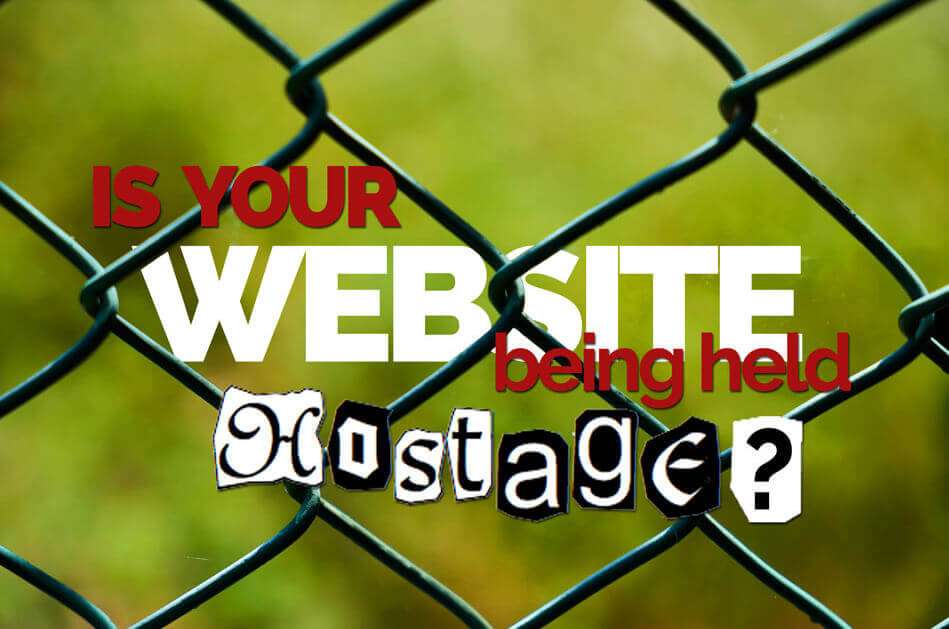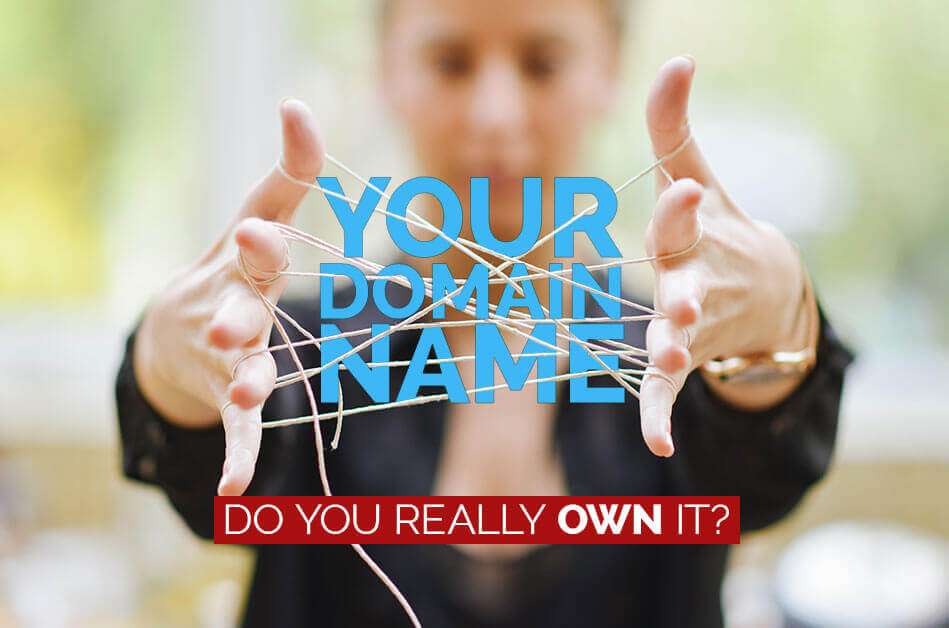Do You REALLY Own Your Website?

A large part of my time is spent working on website re-designs. Many businesses are just early adopters noticing that times have changed but their site has not. Others just need a real business focused website with clear Call To Actions and a Fast Loading, Mobile Friendly website.
Then there are the unfortunate ones that find themselves with an out of date content and an outdated looking website they just can’t access. If that’s not bad enough, they are about to discover they don’t even own their own the domain name. The company who sold them the original website set everything up for them and didn’t transfer ownership. Now the developer is no longer in business or has left the area, country (or worse) and doesn’t respond to emails. Sometimes they claim you were only renting the domain from them.
You’d think ICANN would be able to help with ownership disputes, they can and do to a certain extent but it’s not easy or cheap! So it’s best not to put yourself in that situation in the first place.
Domain Name & Hosting
If there’s one issue I see time and time again with redesign projects, it’s that clients don’t control or even have access to their domain registrar or hosting accounts. Which essentially means they don’t actually own their company website.
Rule #1 = Make sure you OWN your domain name.
Rule #2 = Make sure you OWN your hosting account.
❝ As the two most essential elements that control your website/business online, make sure you OWN your domain name & hosting account! ❞
Ownership: Does it really matter?
I won’t tell you how many times I have heard the same story. They signed a contract with a bad vendor and ended up with a site that they couldn’t update and/or didn’t get the site they expected.
The day comes when you want to move your site to a new hosting company or change DNS settings on your domain.
Faced with losing business the original provider refuses to raise a finger during the migration process or worse actively sabotaged the process. Unfortunately, this is not simply a one-time case, but a business practice where unscrupulous web providers build and host web sites but the knowing clients don’t actually own the sites.
I’ve also had lots of good experiences too. But until you start the process, you never know which way it’s going to go.
Responsibility:
It’s not just the vendors, often clients seek a hands-off solution for their website – especially when it comes to domains and hosting. It does take more time to have clients register their own accounts or to create them and transfer ownership. Sometimes even though it’s in the clients best interest there’s often resistance.
So I completely understand the temptation to do it the easy way. I just prefer to help people make the right choices because it’s in their companies best interest. Even if they don’t know it yet.
Just as it’s never a good idea to build property on land you don’t own (or have the rights to). Don’t build a website on a domain you don’t own.

Protect Yourself: ask the right questions.
The final decision to invest in a new website or redesign is often made in a rush. There’s almost always some deadline looming, or the business needs to prepare for a seasonal sales/marketing schedule. That’s just the way of the world. But there’s no reason to skip over important details.
Protecting yourself is as easy as asking the right questions.
- Will the Domain name be registered to me?
- Will we have full & direct access to the DNS registration (ie. username + password)?
- Will we have complete access to the website backend if requested? (This would include FTP, Control Panel and/or Shell access)
- Is the CMS or e-commerce system proprietary or is it a system that is commonly used by other service providers?
If the answer to any of those questions is anything other than YES, you could be in for an expensive shock down the line.
While you’re at it ask if the site will be secured by an SSL Certificate and use the new http2 protocols.
5. Does the hosting include SSL certificate?
Finally, ask if there will be other websites on the same server? If yes, ask how many?
6. How many websites will share the same IP address?
If you’ve ever run too many apps on your phone at the same time and noticed it slow down slightly, it’s common for budget shared servers to have thousands of websites running on the same server. There’s a reason these are cheap. Check how many websites are on your shared server.
Website Hosting: Fast, Reliable & Affordable
Controlling your own hosting account isn’t as vital as owning your own domain name, but it’s a really good idea. Having a fast host that’s reliable just makes sense.
As with most things, you get what you pay for. Hosting is no different but selecting the right hosting package can be overwhelming. Plus most hosting companies don’t make it easy to compare apples to apples and often the stats displayed are of little relevance.
Shared Hosting
Most small businesses only need some form of shared server. Shared hosting is where your website shares hosting space with other websites. Just as any phone or computer will start to slow down the more apps and programs you run at the same time, shared hosting shares the server resources across multiple websites.
Not all shared hosting is equal. Modern servers are impressive bits of kit, having a hundred small domains on a server isn’t that much of a problem 99% of the time. But really cheap shared hosting can often have thousands of websites on a single shared server. For hobby sites, it’s not a problem. Your site goes down a few times a week or month and it’s no problem at all.
For a business website. It’s important to be fast and reliable. Your website reflects 100% on your business – not on the hosting company. If your site is out of date, slow and frequently doesn’t work, the message you’re sending isn’t one of professionalism and reliability.
❝ First impressions take less than 50 milliseconds, that’s faster than the blink of an eye❞
I like to keep it simple. From shared to dedicated servers, there’s only one hosting company I’m confident will maintain the quality of service I work hard to provide my clients.
Because of our Website Maintenance service, I still get to work with a wide selection of hosting companies, including most of the largest names in the industry. Selecting the right web host is unique for each person. With the market constantly changing, CHEMICLOUD is a new favourite due to their quick performance and exceptional value.
Your Domain: How to check it yourself
If you registered your own domain, you shouldn’t have a problem but if it was set up by a third party then check your domain with whois.icann.org and you should see your own details under the Registrant Contact and especially the Administrative Contact sections should display an email address that ONLY you have access to.
If the details are marked as private. In which case can just contact the company who set it up and ask them.
Most times when a business/vendor has registered a domain for you, it’s because you asked them to. So now that you know better, it’s something they should be more than happy to resolve for you. Yes, it’s a little hassle, but it’s worth doing!
❝ Without direct access to the Administrative Contact email account listed, you do not control your domain name. ❞
Administrative Contact Email Address
Remember, if it isn’t your email address displayed as the ADMIN, then you will need the cooperation of the person with access to the email, to help transfer ownership to you.
While it is a very straight forward process, taking a few minutes to implement. Getting a third party to co-operate in a timely manner (in my experience) takes 2-3 weeks and a dozen or more emails, messages, and phone calls. It’s precisely those bad experiences, reclaiming clients websites that prompted me to write this article.
NOTE: Moving a domain to a new registrar will involve your website going down for short time. So the best option would be to make a new account with the registrar and get your third party to process a change of ownership.
Useful Links
- Shows how many websites are on the same server
https://viewdns.info/reverseip/ - Displays the registered owner information of a domain name
https://whois.icann.org/en/lookup?name=
If you’re thinking about updating your website or have run into similar problems, we’d love to hear what happened. Feel free to add your comments and or questions below and I will respond ASAP.










